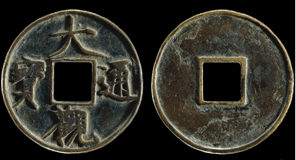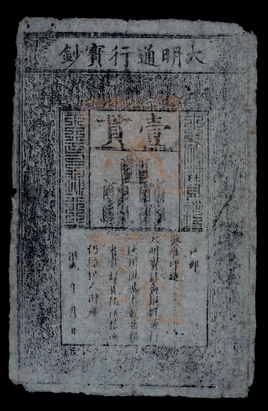The Song Economic Revolution
From Copper Coins to Paper Notes
Helping to grease the wheels of trade during the Song was the world’s first paper money.
 |
|
Bronze Kaiyuan tongbao coin |
For centuries, the basic unit of currency in China was the bronze or copper coin with a hole in the center for stringing. Large transactions were calculated in terms of strings of coins, but given their weight these were cumbersome to carry long distances.
As trade increased, demand for money grew enormously, so the government minted more and more coins. By 1085 the output of coins had increased tenfold since Tang times to more than 6 billion coins a year.
The use of paper currency was initiated by merchants. To avoid having to carry thousands of strings of coins long distances, merchants in late Tang times (c. 900 CE) started trading receipts from deposit shops where they had left money or goods. The early Song authorities awarded a small set of shops monopoly on the issuing of these certificates of deposit, and in the 1020s the government took over the system, producing the world’s first government-issued paper money.
 |
|
Great Ming Circulating Treasure Note |
|
According to Marco Polo
Marco Polo astonished the Western world when he described the use of paper currency throughout Khubilai Khan’s Yuan dynasty:
With these pieces of paper, made as I have described, he [Khubilai Khan] causes all payments on his own account to be made; and he makes them to pass current universally over all his kingdoms and provinces and territories, and whithersoever his power and sovereignty extends. And nobody, however important he may think himself, dares to refuse them on pain of death. And indeed everybody takes them readily, for wheresoever a person may go throughout the Great Kaan’s dominions he shall find these pieces of paper current, and shall be able to transact all sales and purchases of goods by means of them just as well as if they were coins of pure gold. And all the while they are so light that ten bezants’ worth does not weigh one golden bezant.
Furthermore all merchants arriving from India or other countries, and bringing with them gold or silver or gems and pearls, are prohibited from selling to any one but the Emperor. He has twelve experts chosen for this business, men of shrewdness and experience in such affairs; these appraise the articles, and the Emperor then pays a liberal price for them in those pieces of paper. The merchants accept his price readily, for in the first place they would not get so good a one from anybody else, and secondly they are paid without any delay. And with this paper-money they can buy what they like anywhere over the Empire, whilst it is also vastly lighter to carry about on their journeys. And it is a truth that the merchants will several times in the year bring wares to the amount of 400,000 bezants, and the Grand Sire pays for all in that paper. So he buys such a quantity of those precious things every year that his treasure is endless, whilst all the time the money he pays away costs him nothing at all. Moreover, several times in the year proclamation is made through the city that anyone who may have gold or silver or gems or pearls, by taking them to the Mint shall get a handsome price for them. And the owners are glad to do this, because they would find no other purchaser give so large a price. Thus the quantity they bring in is marvellous, though these who do not choose to do so may let it alone. Still, in this way, nearly all the valuables in the country come into the Kaan’s possession. (1)
![]()
Notes
(1) Marco Polo and Rustichello of Pisa, “Book Second, Part I, Chapter XXIV: How the Great Kaan Causeth the Bark of Trees, Made into Something Like Paper, to Pass for Money over All His Country,” in The Book of Ser Marco Polo: The Venetian Concerning Kingdoms and Marvels of the East, translated and edited by Colonel Sir Henry Yule, Volume 1 (London: John Murray, 1903). This book is in the public domain and can be read online at Internet Archive. Chapter XXIV begins on page 378 of this online text.